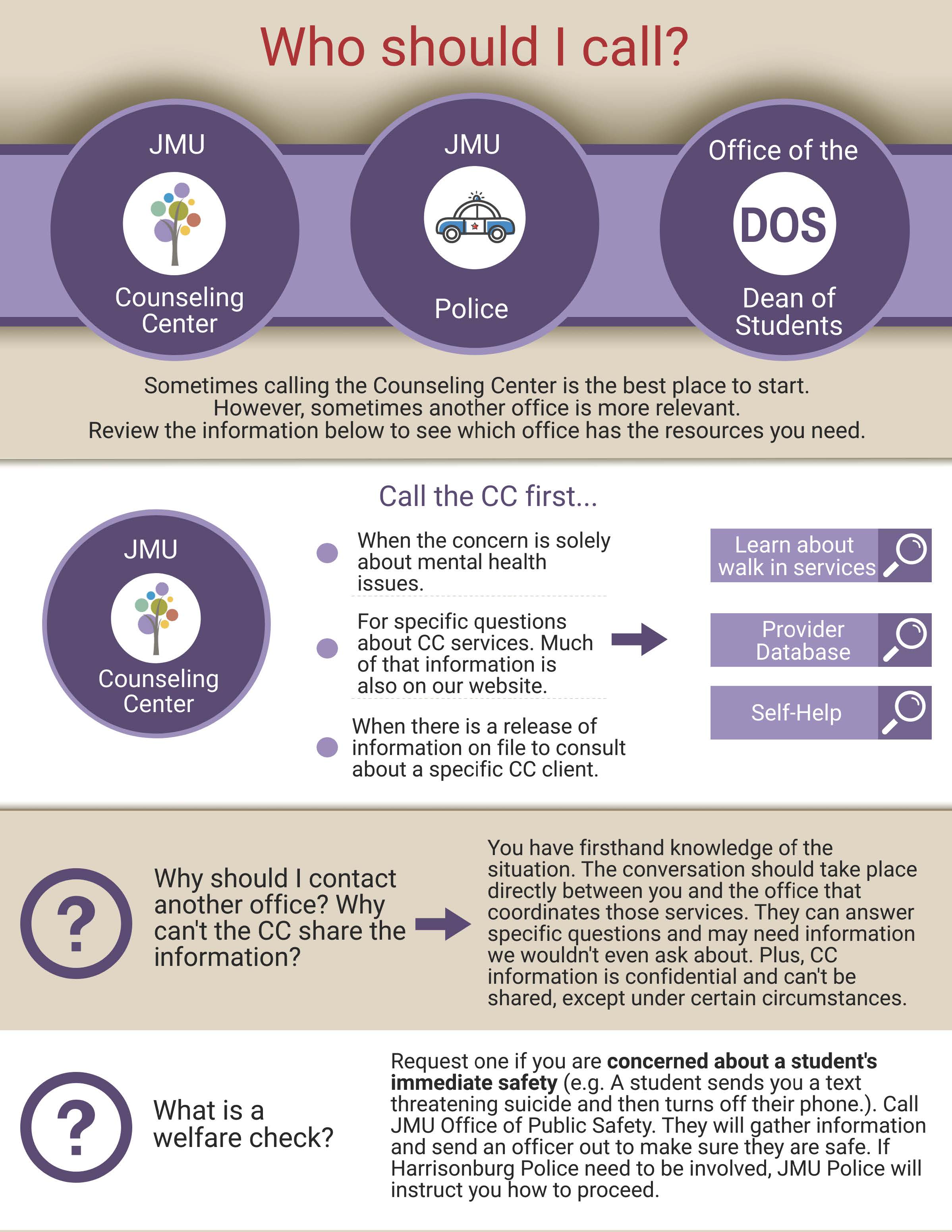Consultation At A Glance
If you are concerned about a James Madison University student in distress, you can call to connect with a Counseling Center clinician (540-568-6552). They will help you develop a plan to respond to the situation and connect you with the appropriate resources. Read the following information before your consultation and review the info-graphic below to see if there are other offices you should contact first.
What is Consultation?
Friends, family, roommates, and professors of JMU students are often the first to notice problems and hear about concerns students may be having, which means they are generally in great positions to provide helpful information. A consultation is an opportunity to talk with a clinician about your concerns regarding students that have shown signs of unusual, problematic, or potentially harmful behaviors that could impact the JMU community.
During this consultation, you can speak about whatever concerns you might have. We will ask you questions to make sure we thoroughly understand the situation and will assist you in developing a plan to effectively deal with it. And if the situation requires additional assistance from a campus or community professional, we will support you through that process as well.
Possible Consultation Recommendations
Based on the information you share, the clinician may recommend any of the following action for you or the student:
- Walk-in for an Initial Assessment at the Counseling Center
- Access Emergency Services
- Contact the Dean of Students
- Initiate a welfare check through the JMU Police Department
- Complete a psychiatric assessment at Sentara RMH
- Offer support to the student and create healthy boundaries
Please refer to our Consultation form to learn how the information you provide will be used. Review the "Who Should I Call" info-graphic to learn where to start.
Signs That A Student Is In Distress
- Changes in personality - noticeably sad, angry, irritable, anxious, or apathetic lasting for several days.
- They start skipping classes, failing assignments, or not completing their work.
- Recent significant loss - relationship, friendship, death of an important person, a traumatic event.
- Withdrawal from others - friends, family, classes, and abandoning previously enjoyed activities.
- Express helplessness and hopelessness - they struggle seeing things getting better. When students lose hope, they are much less motivated to put forth an effort to change and they may have thoughts of suicide.
- Changes in eating and sleeping patterns. Sustained periods of significant changes in eating habits or insomnia can have serious consequences.
- Abuse of alcohol and/or drugs, especially when it leads to hostile, impulsive, reckless and/or violent behavior.
- Appearing disoriented or "out of it" (e.g., less aware of what is going on around them, more forgetful, rambling or disconnected speech, and/or behavior that seems out of context or bizarre).
- Talking about completing suicide (ranging from vague statements like "Everyone would be better off without me" and "It won't matter soon" to direct and clear statements like "I'm going to kill myself"). Most people who contemplate suicide give some warning of their intentions to someone close to them.
- Talking about harming others (e.g., verbal threats, threatening emails, harassing or stalking behaviors, papers/exams that contain violent material). All such statements and actions must be taken seriously.
There are several helpful things to keep in mind as you try to assist a student in distress. If you have any questions about treatment recommendations, Who We See and Why, provides helpful information about our clinical model.

